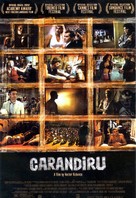Reviews provided by RottenTomatoes
Rene Rodriguez, Miami Herald: A soft, simplistic look at a tough, complicated subject. Read more
Michael Wilmington, Chicago Tribune: After watching Carandiru, one recalls the movie's inmates with sadness, the doctor with affection, the prison with fear and loathing and the movie with that sure, strong recognition you feel after seeing, for the first time, a classic. Read more
Jeff Shannon, Seattle Times: Has moments of raw, unflinching power. Read more
Steve Murray, Atlanta Journal-Constitution: The movie has a tactile reality. You can almost smell it. Read more
Wesley Morris, Boston Globe: Babenco brings the place and the prisoners alive. Read more
Kevin Crust, Los Angeles Times: It plunges us deep inside a corrupt system and its sincere empathy creates a stirring mix of emotions. Read more
J. R. Jones, Chicago Reader: Babenco weaves the stories of a dozen inmates into a densely textured fabric, capturing the feel of a closed society whose members have lost their freedom yet still maintain a tenuous grip on their humanity. Read more
Eric Harrison, Houston Chronicle: We come to like [the characters], to respect their yearning for redemption, which is why the ending is so powerful. Read more
Lisa Kennedy, Denver Post: Babenco's side trips into the prisoners' lives give the movie a complicated integrity. Read more
Owen Gleiberman, Entertainment Weekly: Lays on the compassion a little thick, yet its heartfelt squalor stays with you. Read more
Liam Lacey, Globe and Mail: The two-part structure feels inescapably manipulative. Read more
Jane Sumner, Dallas Morning News: An urgent piece of cinema -- a shiv in the ribs and right cross to the chin -- that's also a salutation to human solidarity and the will to live. Read more
John Patterson, L.A. Weekly: One of the richest prison movies in years. Read more
Lisa Rose, Newark Star-Ledger: [Babenco] tries to create the illusion of substance by crowding the film with plotlines, but all it really amounts to is lack of focus and purpose. Read more
Elizabeth Weitzman, New York Daily News: Though the film is based on fact, most of its characters exist only in movies. Read more
Stephen Holden, New York Times: Hector Babenco's sprawling portrait of Brazil's criminal class exudes a throbbing flesh-and-blood intensity so compelling that it's impossible to avert your eyes. Read more
Jay Boyar, Orlando Sentinel: We're served up meaty, often spicy, slices of sadly wasted lives. Read more
Roger Ebert, Chicago Sun-Times: It shows 8,000 men jammed into space meant for 4,000, and enforcing their own laws in a place their society has abandoned. Read more
Mick LaSalle, San Francisco Chronicle: One might expect a dreary, depressing film, and to an extent it is, but there are many flashes of lightness, not of humor so much as of simple human vividness, which keeps challenging us to see the prisoners as individuals. Read more
Jeff Strickler, Minneapolis Star Tribune: Carandiru is no typical prison movie. And that's a good thing. Read more
Peter Howell, Toronto Star: Despite its structural flaws, Carandiru presents more interesting characters than you'd see in a dozen other prison movies. Read more
Mike Clark, USA Today: The Kiss of the Spider Woman director's first film in seven years staves off viewer monotony and claustrophobia in portraying the fate of 7,800 inmates packed into a prison built for half as many. Read more
Deborah Young, Variety: It moves forward on the sheer strength of its portraiture, thanks to an exceptionally good ensemble cast that brings the inmates to life as individuals, not genre types. Read more
Jessica Winter, Village Voice: Every scene is cut from factory-issue prison-genre cloth to fit jailhouse stock characters. Read more
Stephen Hunter, Washington Post: As a 2 1/2-hour sentence to the graybar hotel, the movie can't be topped. Read more
Michael O'Sullivan, Washington Post: It is Carandiru's ability to humanize its central characters -- to make you care about the murderers, thieves, junkies and whores who are Carandiru's citizens, and its doomed heroes -- that gives the movie its wrenching, tragic power. Read more

